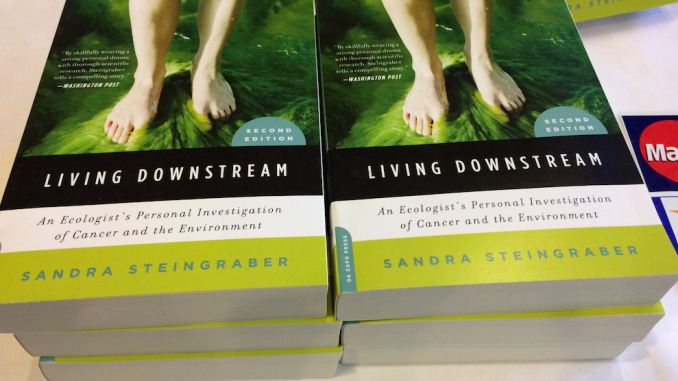
New York State banned fracking over one year ago but the dangers of fossil fuels continue to infiltrate the state.
Biologist, author and climate change activist Sandra Steingraber co-founded New Yorkers Against Fracking, an advocacy group for the statewide ban of fracking, which became successful in June 2015. She was the keynote speaker at the first New York State Sustainability Conference, which was adapted from the SUNY Sustainability Conference and included private colleges beginning this year. Steingraber’s speech, held in Lecture Center Room 100 on Wednesday, Nov. 2, was co-sponsored by the Office of Campus Sustainability and the Environmental Task Force.
As a former research biologist and cancer survivor, Steingraber has studied the effects of fossil fuels on human health at length. According to Lisa Mitten, Campus Sustainability Coordinator, “[she] is a world-renowned authority on the links between the impacts of petroleum products throughout modern society on human health.”
Co-chair of the Environmental Task Force and biology professor, Michael Boms, worked with Mitten to bring Steingraber to campus.
“Companies are putting out all these chemicals for no reason other than to gain a profit,” he said. “She is an outspoken person against that and it’s important.”
Addressing students, professors and conference guests, Steingraber delivered a comprehensive overview on how the world views climate change and the surrounding issues, including current proposed pipelines and oil storage projects. The activist named companies that are going forward with such projects, notably Crestwood in Texas which now brings oil to New York State and is joining forces with electric company Con-Edison to create underground fossil fuel storage. According to Steingraber, the infrastructure would infringe on the salt lines of a lake that provides drinking water to 100,000 people.
“Maybe you’ve heard of this lake,” Steingraber said. “It’s named Seneca.”
She continued by explaining the definitions of sustainability, the chemical impact of fossil fuels and the environmental, health and financial effects of climate change. She also pointed to grassroots movements that have formed to prevent climate change and advocate for sustainable energy sources.
“Our state is a battleground between the past and the future. The past has been everything we’ve ever known and involves digging fossils out of the bedrock and lighting them on fire,” she said. “The future is the vision where we look up instead of down for our energy to wind, solar and water.”
Steingraber’s talk arrived at a time when protesters are standing against the Dakota Access pipeline at Standing Rock, North Dakota, which came into the public eye through Facebook posts last week. She likened the protests to local issues, such as the proposed Pilgrim Pipeline that would would run from Albany to Linden, New Jersey.
“The eyes of the world are now on the Standing Rock as they stand against the crossing of that pipeline through sacred land,” Steingraber said. “True to the name, they are standing like a rock against that access pipeline.”
She then addressed ways that universities can fight against climate change, such as integrating the topic into course curriculums, divesting from fossil fuels and encouraging more sustainable energy projects on campus. She commended Ithaca College sustainability coordinator Greg Lischke, in the audience, for helping create a solar farm that now provides 10 percent of the institution’s energy where Steingraber currently teaches.
Finally, she displayed photos of New Yorkers who have protested proposed oil storage infrastructure and pipelines, including groups of women, doctors and veterans.
“These are some examples of the standing rocks of New York,” she said. “There are standing rocks going on all over.”
